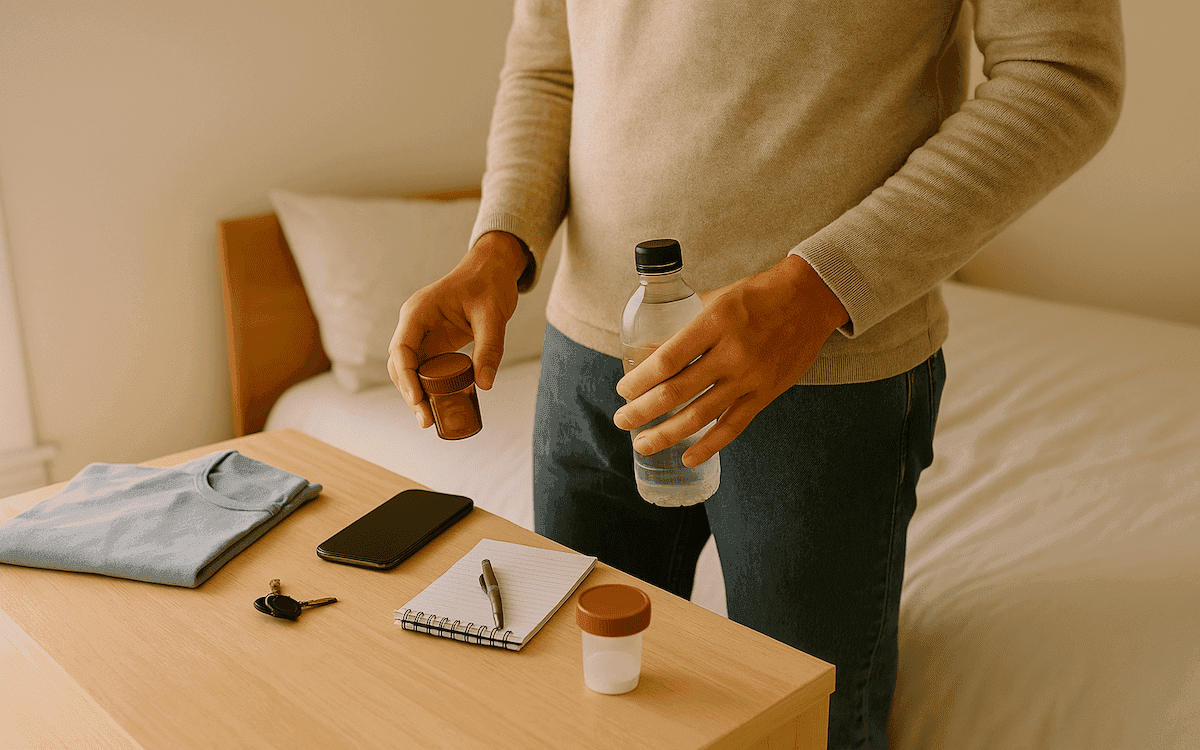Un análisis de semen es una de las pruebas más informativas para conocer la fertilidad masculina. Mide el recuento de espermatozoides, su movilidad, forma y otros parámetros que desempeñan un papel vital en la concepción. Saber cómo prepararte para un análisis de semen te ayuda a sentirte más seguro y garantiza que los resultados reflejen con precisión tu salud reproductiva.
Respuesta rápida: Para prepararte para un análisis de semen, evita eyacular durante 2-5 días, mantente hidratado, evita el alcohol y el tabaco, y sigue las pautas de recogida de semen de tu clínica para obtener los resultados más fiables.
Aunque el proceso pueda parecer incómodo, es un procedimiento médico estándar que se realiza con cuidado y confidencialidad. Seguir unos sencillos pasos antes de tu cita ayuda al equipo médico a obtener la imagen más precisa de tu potencial de fertilidad.
Por qué es importante la preparación para el análisis de semen
La calidad del semen puede variar de un día para otro. Factores como una enfermedad reciente, el consumo de alcohol, el uso de medicamentos y el tiempo transcurrido desde tu última eyaculación pueden influir en los resultados de las pruebas. Las clínicas proporcionan instrucciones específicas de preparación de la muestra de semen para reducir la variabilidad y garantizar lecturas precisas del recuento, la movilidad y la morfología de los espermatozoides.
Si estás planeando un tratamiento de fertilidad o evaluando la salud del esperma, una preparación adecuada puede marcar una diferencia apreciable. Aprender a mantener la integridad del esperma mediante el estilo de vida y el momento adecuado, como se indica en la guía de Conceivio sobre pasos esenciales para salvaguardar la calidad del esperma, puede mejorar la precisión y fiabilidad de tu análisis de semen.
Cómo prepararte antes del análisis
1. Periodo de abstinencia
La mayoría de las clínicas recomiendan abstenerse de eyacular durante 2-5 días antes de un análisis de semen. Esta duración suele equilibrar el recuento y la motilidad espermáticos.
Algunos estudios sugieren que una abstinencia más breve (1-2 días) puede mejorar la calidad del ADN espermático. Tu médico puede ajustar la recomendación en función de si el objetivo es la cantidad de espermatozoides o la integridad del ADN.
Los beneficios de las pruebas de esperma en casa también pueden ayudarte a controlar los cambios en la calidad del esperma entre una prueba y otra.
2. Ajusta los hábitos de vida
Las elecciones de estilo de vida desempeñan un papel importante en la salud del esperma. En la semana previa a la prueba:
- Reduce el consumo de alcohol y cafeína.
- Evita fumar o vaporizar.
- Mantente hidratado y descansa lo suficiente.
- Come alimentos que favorezcan la fertilidad, como los ricos en zinc y antioxidantes.
Incluso pequeños cambios en la dieta, como incluir los 5 alimentos para mejorar la calidad del esperma, pueden afectar positivamente a los resultados de las pruebas.
3. Revisa tu medicación
Ciertos medicamentos y suplementos pueden afectar temporalmente a la producción o motilidad de los espermatozoides. Comenta con tu médico cualquier receta o producto de venta libre antes de realizar la prueba. Pueden sugerirte que interrumpas o reprogrames la prueba para garantizar unos resultados más fiables.
4. Ten en cuenta tu estado de salud
Una enfermedad reciente, fiebre o infección pueden reducir el recuento de espermatozoides durante varias semanas. Notifica a tu clínica cualquier cambio reciente en tu salud. Comprender la conexión entre el bienestar general y los resultados reproductivos, como se explica en el artículo de Conceivio sobre cómo apoyar tu viaje de fertilidad con la nutrición y el estilo de vida, puede ayudar a mejorar la preparación para la prueba.
Qué esperar el día de tu prueba de semen
- Llegada: Lleva tu documento de identidad y la documentación del laboratorio, y llega puntual.
- Sala de recogida: La mayoría de las clínicas proporcionan un espacio privado para que proporciones la muestra en un recipiente estéril. Algunas pueden permitir la recogida en casa si la muestra llega al laboratorio en menos de una hora.
- Limpieza: Lávate las manos y los genitales antes para evitar la contaminación.
- Evita los lubricantes o los preservativos normales: Pueden dañar el esperma. Si es necesario, utiliza sólo opciones de recogida seguras para el esperma.
Comprender qué mide un análisis de semen puede ayudarte a interpretar tus resultados con más confianza.
Recomendaciones para recoger la muestra
- Utiliza sólo el recipiente estéril suministrado.
- Recoge toda la muestra, especialmente la primera porción, que contiene la mayor concentración de espermatozoides.
- Mantente relajado. El estrés puede interferir en la eyaculación. Lleva algo calmante, como música, si te ayuda.
Si recoges la muestra en casa, mantenla cerca de la temperatura corporal, por ejemplo en el bolsillo, hasta que la lleves a la clínica.
Después de la recogida: Entrega y seguimiento
- Entrega la muestra en el plazo de una hora desde la recogida, manteniendo la temperatura corporal.
- Pregunta por el plazo de obtención de resultados. La mayoría de las clínicas proporcionan los resultados en pocos días.
- Realiza un seguimiento si se solicita repetir la prueba, ya que las características del esperma pueden variar de forma natural.
Explorar temas como el microbioma del semen en la fertilidad masculina y la infertilidad masculina como pieza que falta en el rompecabezas de la fertilidad también puede proporcionar una visión más profunda de los factores que influyen en los resultados.
Conclusión
La preparación para un análisis de semen es sencilla pero importante dentro de las pruebas de fertilidad. Abstenerse durante unos días, mantener un estilo de vida saludable y seguir las pautas de recogida garantizan unos resultados precisos y una comprensión más clara de tu salud reproductiva. Mejorar la salud del esperma a lo largo del tiempo mediante una nutrición equilibrada, el control del estrés y la constancia también puede favorecer los objetivos de fertilidad a largo plazo.
En Conceivio, creemos que el cuidado de la fertilidad debe tener una base científica y ser inclusivo. Tanto si estás explorando cómo mejorar la calidad del esperma, aprendiendo sobre el papel de los microbios en la fertilidad, o buscando formas de superar los problemas de fertilidad, nuestro equipo está aquí para guiarte con rigor científico y empatía.
Descárgate la Aplicación Conceivio para reservar evaluaciones de fertilidad, hacer un seguimiento de los resultados y acceder a recursos educativos de confianza que te ayuden en tu camino hacia la paternidad.












